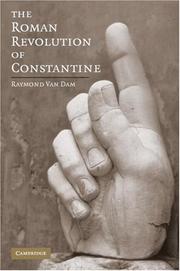| Listing 1 - 2 of 2 |
Sort by
|

ISBN: 110718519X 0511341040 128108526X 9786611085261 0511819471 0511342152 0511341628 0511574215 0511342683 9780511342684 9780511341045 9780511819476 9780511574214 9780521882095 0521882095 9780521133012 0521133017 Year: 2007 Publisher: Cambridge : Cambridge university press,
Abstract | Keywords | Export | Availability | Bookmark
 Loading...
Loading...Choose an application
- Reference Manager
- EndNote
- RefWorks (Direct export to RefWorks)
The reign of the emperor Constantine (306-337) was as revolutionary for the transformation of Rome's Mediterranean empire as that of Augustus, the first emperor three centuries earlier. The abandonment of Rome signaled the increasing importance of frontier zones in northern and central Europe and the Middle East. The foundation of Constantinople as a new imperial residence and the rise of Greek as the language of administration previewed the establishment of a separate eastern Roman empire. Constantine's patronage of Christianity required both a new theology of the Christian Trinity and a new political image of a Christian emperor. Raymond Van Dam explores and interprets each of these events. His book complements accounts of the role of Christianity by highlighting ideological and cultural aspects of the transition to a post-Roman world.
Church history --- Apostolic Church --- Christianity --- Church, Apostolic --- Early Christianity --- Early church --- Primitive and early church --- Primitive Christianity --- Fathers of the church --- Great Apostasy (Mormon doctrine) --- Constantine --- Constantijn, --- Constantin, --- Constantin --- Constantine, --- Constantino --- Constantinus Flavius Valerius Aurelius, --- Constantinus --- Constantinus, --- Costantino --- Costantino, --- Flaviĭ Valeriĭ Avreliĭ Konstantin, --- Flavius Valerius Aurelius Constantinus Augustus, --- Flavius Valerius Aurelius Constantinus, --- Flavius Valerius Constantinus, --- Konstantin, --- Konstantin --- Kōnstantinos, --- Kōnstantinos --- Konstantyn, --- Kostandianos --- Κωνσταντίνος, --- Флавий Валерий Аврелий Константин, --- Константин --- Константин, --- Flavije Valerije Konstantin --- Rome --- History --- Eglise --- Histoire --- Arts and Humanities --- Church history - Primitive and early church, ca. 30-600 --- Constantin empereur --- Constantine - I, - Emperor of Rome, - d. 337
Digital
ISBN: 9780511819476 Year: 2007 Publisher: Cambridge Cambridge University Press
Abstract | Keywords | Export | Availability | Bookmark
 Loading...
Loading...Choose an application
- Reference Manager
- EndNote
- RefWorks (Direct export to RefWorks)
| Listing 1 - 2 of 2 |
Sort by
|

 Search
Search Feedback
Feedback About UniCat
About UniCat  Help
Help News
News